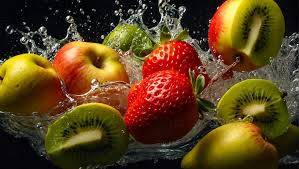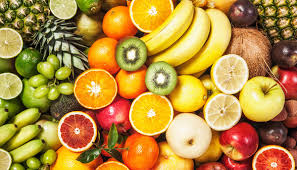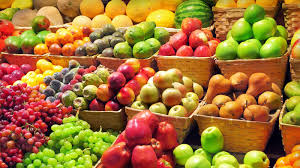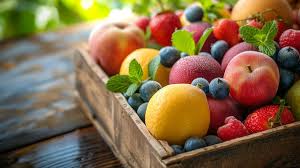Table of Contents
ToggleFresh fruits are among the most vibrant and nutritious foods on the planet. Packed with essential vitamins, minerals, and antioxidants, they are a cornerstone of a healthy diet. Their natural sweetness, variety, and versatility make them a favorite across cultures and cuisines. From juicy berries to tropical delights, fresh fruit are a testament to the richness of nature.
What Defines Fresh Fruits?

Fresh fruits are those that are harvested at their peak ripeness and consumed in their natural state without undergoing significant processing. Unlike preserved or dried fruits, fresh fruit retain their full nutritional value, flavor, and texture. They are available in a multitude of shapes, colors, and tastes, each offering unique health benefits.
Nutritional Benefits of Fresh Fruits
Fresh fruits are celebrated for their health-enhancing properties. Their high nutrient density and low calorie count make them a vital component of a balanced diet. Here are some of the key benefits:
- Rich in Vitamins and Minerals: Fresh fruit provide essential nutrients such as vitamin C, potassium, and folate, supporting immune function, heart health, and cell repair.
- High in Fiber: Fruits like apples, pears, and berries are excellent sources of dietary fiber, aiding digestion and promoting gut health.
- Packed with Antioxidants: Many fruits, including blueberries and oranges, are rich in antioxidants that combat oxidative stress and reduce inflammation.
- Low in Calories: Fresh fruits are naturally low in calories, making them a guilt-free snack or dessert option.
- Hydrating: Fruits with high water content, such as watermelon and cucumber, help maintain hydration levels, especially during warm weather.
Types of Fresh Fruits
The diversity of fresh fruits is astounding, with each type offering distinct flavors, textures, and nutritional profiles. Here’s a look at some of the main categories:
Citrus Fruits
Citrus fruits like oranges, lemons, and grapefruits are tangy and refreshing. They are rich in vitamin C and flavonoids, making them excellent for boosting immunity and skin health.
Berries
Berries such as strawberries, blueberries, and raspberries are small but mighty in terms of nutrition. They are loaded with antioxidants, vitamins, and fiber, supporting heart health and cognitive function.
Stone Fruits
Stone fruits like peaches, cherries, and plums have a sweet, juicy flesh surrounding a hard pit. They are a great source of vitamins A and C, promoting eye health and collagen production.
Tropical Fruits
Tropical fruits like mangoes, pineapples, and bananas offer exotic flavors and are rich in vitamins and minerals. Their natural sweetness makes them ideal for desserts and smoothies.
Melons
Melons like watermelon, cantaloupe, and honeydew are hydrating and refreshing. They are perfect for hot days and are a good source of vitamins A and C.
Apples and Pears
These fruits are versatile and available year-round. They are high in fiber and antioxidants, supporting digestive health and reducing the risk of chronic diseases.
Grapes
Grapes are sweet and easy to snack on. They contain resveratrol, a powerful antioxidant that supports heart health.
Exotic Fruits
Exotic fruits like dragon fruit, lychee, and passion fruit add a touch of adventure to your plate. They are rich in vitamins and offer unique textures and flavors.
Fresh Fruits in Culinary Creations

Fresh fruits are not only nutritious but also incredibly versatile in the kitchen. They can be used in a variety of ways to create delicious and visually appealing dishes.
Breakfast
Add fresh fruits like bananas, berries, or mangoes to your oatmeal, yogurt, or smoothies for a nutrient-packed start to the day.
Salads
Fruits like apples, oranges, and pomegranates add a burst of sweetness and crunch to salads. Combine them with greens, nuts, and a light dressing for a balanced meal.
Desserts
Use fresh fruits to make fruit tarts, sorbets, or parfaits. Their natural sweetness reduces the need for added sugars.
Snacks
Enjoy fruits like grapes, cherries, or sliced watermelon as a quick and healthy snack on the go.
Beverages
Blend fresh fruits into smoothies, infuse them in water, or squeeze them into juices for a refreshing drink.
The Role of Fresh Fruits in Culture and Tradition
Fresh fruits hold cultural and symbolic significance in many parts of the world. They are often associated with abundance, health, and celebration.
- Festivals: In many cultures, fruits are central to festivals and ceremonies. For example, Chinese New Year features oranges and tangerines as symbols of luck and prosperity.
- Gifts: Fruits are commonly given as gifts to express goodwill and hospitality.
- Rituals: In religious ceremonies, fruits are offered as a token of gratitude and reverence.
Choosing and Storing Fresh Fruits

To enjoy fresh fruits at their best, it’s important to togelup select and store them properly. Here are some tips:
- Select Seasonal Fruits: Seasonal fruits are fresher, tastier, and often more affordable than out-of-season varieties.
- Check for Ripeness: Look for vibrant colors, firm textures, and a pleasant aroma to ensure ripeness.
- Handle with Care: Fresh fruit can bruise easily, so handle them gently.
- Store Appropriately: Store fruits like apples and oranges in the refrigerator, while bananas and mangoes can be kept at room temperature until ripe.
Fresh Fruits and Sustainability
Choosing fresh, locally grown fruits supports sustainable agriculture and reduces the carbon footprint associated with transportation. Opting for seasonal produce also promotes biodiversity and reduces reliance on chemical preservatives.
Benefits of Incorporating Fresh Fruits into Your Diet
Adding fresh fruits to your daily meals is one of the simplest ways to improve your overall health. Here are some practical reasons to make fresh fruits a regular part of your diet:
- Improved Digestion: The high fiber content aids in maintaining a healthy digestive system.
- Weight Management: Fresh fruits are filling yet low in calories, making them ideal for weight control.
- Enhanced Energy: Natural sugars in fruits provide a quick energy boost without the crash associated with processed snacks.
- Disease Prevention: Regular consumption of fresh fruits has been linked to a reduced risk of chronic diseases such as heart disease, diabetes, and cancer.
Creative Ways to Enjoy Fresh Fruits
If you’re looking for fun and innovative ways to incorporate fresh fruits into your meals, consider these ideas:
- Fruit Kabobs: Thread a variety of fruits onto skewers for a colorful and portable snack.
- Frozen Fruit Treats: Freeze fruits like grapes or mango chunks for a cool, refreshing treat.
- Fruit Pizza: Use a cookie or graham cracker base, spread with yogurt, and top with fresh fruit slices.
- Stuffed Fruits: Hollow out fruits like apples or peaches and stuff them with nuts, honey, or granola for a satisfying dessert.
Conclusion
Fresh fruits are a delightful and essential part of a healthy lifestyle. Their vibrant flavors, nutritional benefits, and versatility make them a staple in diets around the world. Whether enjoyed on their own, as part of a dish, or incorporated into beverages, fresh fruits bring a touch of nature’s goodness to every meal. Embrace the diversity of fresh fruits and savor the countless ways they can enrich your health and culinary experiences.

